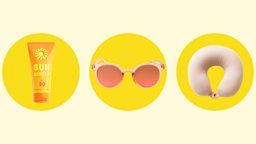Key takeaways:
If you don’t use your flexible spending account (FSA) dollars before the deadline — typically December 31 — you risk losing them.
A health FSA lets you use pretax dollars for eligible medical, dental, and vision expenses, including everyday items like prescription medications and menstrual products.
Some employers offer a grace period or let you carry over a set amount of unused funds into the next plan year, so check your plan details. For 2025, you can carry over up to $660 into 2026 if your employer allows it.
You’ve probably used your health flexible spending account (FSA) to pay for qualified medical expenses like prescription contact lenses, copays, and dental cleanings. But if you have FSA dollars remaining in your account toward the end of your plan year, you’ll want to find other eligible expenses to spend them on soon. FSA money is “use it or lose it,” which means you’ll forfeit leftover dollars in your account after the deadline.
Since a health FSA is an employer-sponsored health benefit, the IRS decides what counts as a qualified expense. You’ll want to use your FSA funds on IRS-approved medical costs to get the most tax savings. Be sure to check with your FSA provider or employer to see what’s eligible under your plan and whether you need paperwork, such as a letter of medical necessity (LOMN), to make an expense FSA eligible. You should also keep receipts and other proof of purchase in case they’re needed for reimbursement.
Below, we’ll share 77 ways to use your health FSA funds for yourself, your spouse, or a qualified dependent.
Search and compare options
Dental
In general, you can use your FSA to pay for care to prevent or treat dental disease from an orthodontist, a dentist, or another qualified dental professional. Here are 18 dental expenses that may qualify as FSA eligible:
Crowns
Dental bonding
Dental bridges
Dental implants
Dental sealants
Dental veneers
Fillings
Gum cleaning
Inlays
Occlusal guards to prevent teeth grinding
Onlays
Teeth cleaning
Tooth removal
X-rays
Quiz: Think you’re an FSA pro? Let’s find out
Vision
If your insurance doesn’t cover all your vision care needs, you can use your FSA funds to pay for items that are considered medically necessary. Below are 13 vision-related items and services you can add to your shopping list before your funds expire:
Contact lens cases
Contact lens solution
Eyeglass cords
Eyeglass protection solutions
Eyeglass repair kits
Eye surgery
Lens cloths
Prescription contact lenses
Reading glasses
Mental health
Surveys show that about 1 in 5 adults was living with a mental illness in 2022. If your insurance doesn’t cover your mental health expenses, you may be able to use FSA funds to cover the following 10 expenses:
Behavioral health modification
Inpatient treatments
Lodging if you travel to receive mental healthcare
Mental health counseling
Psychotherapy
Transportation to mental health appointments
Teletherapy
Treatment for substance use disorder
Family planning
To manage your reproductive health, you may have to pay for family-planning expenses out of pocket. Below are 11 expenses that you may be able to pay for with FSA funds:
Erectile dysfunction medications, like tadalafil (Cialis) and sildenafil (Viagra)
In vitro fertilization (IVF)
Ovulation monitors
Pregnancy tests
Do you have a flexible spending account (FSA)? Learn how FSAs work to avoid losing unused funds.
Can you buy lip balm with an FSA? Yes, if your lip balm meets these requirements.
Do you need sunscreen? Your sunscreen may be FSA eligible if it meets these requirements.
Emergency
Health emergencies can happen anytime, and they can be costly. An ambulance ride, for example, can cost over $1,000 without health insurance. If an emergency arises, you may be able to use your FSA funds to pay for the 10 expenses below:
Airlift to a hospital
Emergency medical services (EMS) devices
Flight to a hospital
Medical record fees
Urgent care services
Everyday items
If you have money left over in your FSA at the end of the year, you can stock up on everyday healthcare products. Here are 16 to consider:
Bandages
Thermometers
Menstrual cups
Menstrual cup cleansers
Nasal sprays
Period underwear
Tampons
Tums
Wheelchair
Read more like this
Explore these related articles, suggested for readers like you.
Which items are not FSA eligible?
Not all health-related expenses are eligible for reimbursement with an FSA. It’s important to review your account’s list of eligible and ineligible expenses to understand what qualifies. For example, cosmetic dental procedures, such as teeth whitening, are typically not eligible because they’re not considered medically necessary. Similarly, items like toothbrushes don’t generally qualify because they are viewed as personal care items rather than medical expenses.
Here are some other expenses that are usually not FSA eligible:
Deodorant
Diapers
Insurance premiums
Shampoo
Soap
Swimming lessons
Toothpaste
In some cases, an expense may become FSA eligible if it’s used to treat a medical condition and is prescribed by a healthcare professional. For instance, weight-loss programs, nutritional counseling, and massage therapy may qualify with a note from your prescriber. But always check with your FSA provider to confirm eligibility for specific items.
When does money in your FSA expire?
Generally, the money in your FSA expires at the end of the plan year. But your employer may give you extra time to use the funds in your account by offering a grace period or a carryover option.
For example, if your FSA plan year ends on December 31 and your employer offers a grace period, you might have until mid-March (2.5 months) to spend the remaining funds in your account. But the timeline could be shorter depending on your plan’s policy.
If your employer gives you a carryover option instead, you can use some or all of your remaining funds during the next plan year. But you should ask your employer about the maximum carryover limit, so you can plan accordingly. For 2025, you can carry over up to $660 into 2026 if your employer allows it. That amount increases to $680 in 2026.
How do you know if an item is FSA eligible?
In Publication 502, titled “Medical and Dental Expenses,” the IRS outlines the requirements for qualified medical expenses. In general, services and supplies related to the diagnosis, cure, mitigation, treatment, or prevention of a disease are considered qualified medical expenses. But it isn’t always easy to identify if specific expenses are eligible.
For example, you can use your FSA to pay for health insurance copays and deductibles, but insurance premiums don’t qualify for reimbursement. Before you make a purchase, it’s important to confirm whether your expense is eligible so you can take advantage of your FSA benefits. If you spend your FSA dollars on ineligible expenses, your reimbursement claim will be denied.
Here are a few steps you can take to get a better idea of which expenses are FSA eligible:
Read your FSA plan documents. When you enroll in an FSA through work, your FSA administrator or employer should provide you with a document that contains the plan’s guidelines. This document should tell you which expenses are eligible for reimbursement through your FSA. Generally, distributions from a health FSA can be used to reimburse qualified medical expenses incurred during your coverage period.
Visit FSA-approved retailers. Some stores make it easy for you to identify FSA-eligible items by tagging them with a label. If you go to these retailers’ websites, you may be able to search for a list of eligible items.
Call your FSA administrator. Some expenses may require an LOMN before they’re considered eligible. Iron supplements, for example, may be eligible for reimbursement if a healthcare professional writes a note stating why the supplements are medically necessary. If you don’t know which expenses require an LOMN, contact your FSA administrator.
Review reimbursement rules. One of the general rules of FSAs is that if your health insurance plan or another source reimburses you for an expense, then it is not FSA eligible.
It’s important to keep your receipts so you can get reimbursed for your items if needed. Depending on your employer’s policy, you may have around 90 days after the plan year ends to submit receipts for reimbursement. Some employers may offer a different timeline, so check with your FSA administrator to confirm your specific deadline.
Frequently asked questions
No, you generally cannot be enrolled in an FSA and a health savings account (HSA) at the same time. But there’s an exception to this rule: A limited-purpose FSA, which typically covers only dental and vision expenses, can be paired with an HSA. You can contribute to an HSA only if you’re enrolled in a qualified high-deductible health plan (HDHP). Since HSA funds never expire, you can always use the money in your account to pay for qualified medical expenses, even if you’re no longer enrolled in an HDHP.
An HSA is a tax-advantaged account you can use to pay for qualified medical expenses, like deductibles, copays, and coinsurance. You can also use HSA funds for certain health insurance premiums, including Medicare premiums, once you’re eligible. HSA funds never expire, so you can save them for future healthcare costs, including hearing aids, dentures, and other eligible expenses during retirement.
No, you generally cannot be enrolled in an FSA and a health savings account (HSA) at the same time. But there’s an exception to this rule: A limited-purpose FSA, which typically covers only dental and vision expenses, can be paired with an HSA. You can contribute to an HSA only if you’re enrolled in a qualified high-deductible health plan (HDHP). Since HSA funds never expire, you can always use the money in your account to pay for qualified medical expenses, even if you’re no longer enrolled in an HDHP.
An HSA is a tax-advantaged account you can use to pay for qualified medical expenses, like deductibles, copays, and coinsurance. You can also use HSA funds for certain health insurance premiums, including Medicare premiums, once you’re eligible. HSA funds never expire, so you can save them for future healthcare costs, including hearing aids, dentures, and other eligible expenses during retirement.
The bottom line
You can use your flexible spending account (FSA) to pay for qualified dental, vision, and medical expenses. Read your account documents or contact your FSA administrator to confirm which items and services are eligible. If your employer doesn’t offer a grace period or a carryover option, you’ll have to use your FSA funds before the end of the plan year.

Why trust our experts?

References
Internal Revenue Service. (2024). Publication 502 (2024), medical and dental expenses.
Internal Revenue Service. (2025). About Publication 502, medical and dental expenses.
Internal Revenue Service. (2025). Topic no. 502, medical and dental expenses.
National Institute of Mental Health. (2024). Mental illness. National Institutes of Health.

















